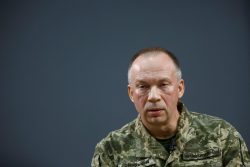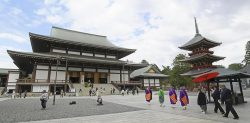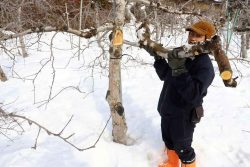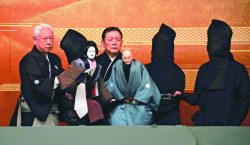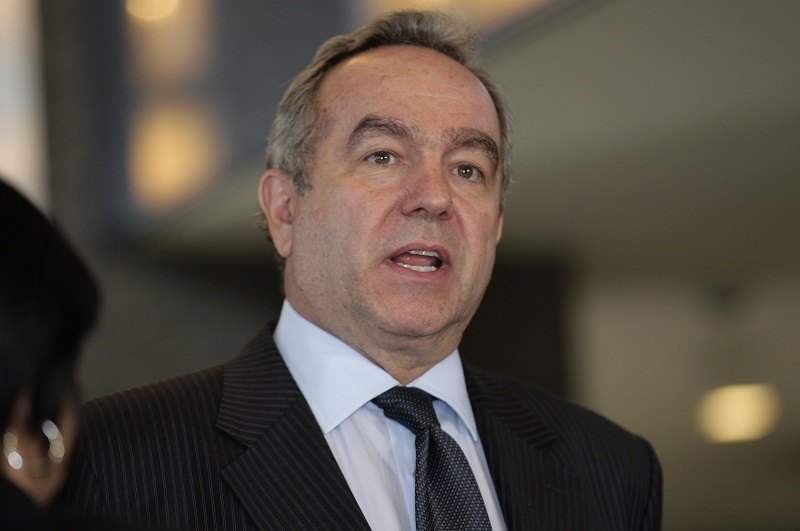
The then U.S. Assistant Secretary of State for East Asia and Pacific Affairs, Kurt Campbell, speaks to the media in Tokyo on Jan. 17, 2013.
16:38 JST, April 23, 2022
SYDNEY/WASHINGTON (Reuters) — A senior-level U.S. delegation met the Solomon Islands’ leader on Friday and warned that Washington would have “significant concerns and respond accordingly” to any steps to establish a permanent Chinese military presence in the Pacific island nation.
A White House statement said Solomon Islands Prime Minister Manasseh Sogavare reiterated to the visiting delegation led by White House Indo-Pacific coordinator Kurt Campbell that there would be no military base, no long-term presence, and no power projection capability under a security deal signed with China.
The White House gave no indication of what the U.S. response would be to such an eventuality, but its blunt tone indicated the level of U.S. concern that led to the dispatch of Campbell’s mission to the remote island country this week.
“If steps are taken to establish a de facto permanent military presence, power-projection capabilities, or a military installation, the delegation noted that the United States would then have significant concerns and respond accordingly,” it said.
“The United States emphasized that it will follow developments closely in consultation with regional partners.”
The statement said the U.S. delegation outlined specific steps Washington would take to advance the welfare of the people of the Solomons, including by expediting the opening of an embassy there, boosting cooperation on unexploded ordinance and sending the Mercy hospital ship to address health issues. It said Washington would also deliver more vaccines and would advance climate and health initiatives.
It said the two sides had “substantial discussion” on the security agreement with China.
“Solomon Islands representatives indicated that the agreement had solely domestic applications, but the U.S. delegation noted there are potential regional security implications of the accord, including for the United States and its allies and partners,” the statement said.
The delegation met Sogavare in the Solomons capital Honiara days after the Solomons and China said they had signed a security pact, despite a flurry of calls from the Washington and its allies urging the island country not to go ahead with a deal they fear will significantly extend China’s military reach in the region.
The Solomon Islands occupy a strategic position in the Pacific and were the scene of some of the bloodiest fighting in that theater of World War Two.
On Wednesday, Sogavare, brushing off the international concerns, told parliament the deal would not undermine peace.
Campbell discussed the security agreement with neighboring Fiji and Papua New Guinea ahead of his visit to Honiara, the U.S. embassy in Papua New Guinea said.
Australian officials said Campbell’s visit likely prompted China and the Solomon Islands to announce the agreement was a done deal.
While Sogavare has ruled out hosting a Chinese military base, U.S. allies Australia and New Zealand have expressed concern the pact would disrupt regional security, allowing Chinese naval vessels to replenish in the Solomons.
Full details have not been disclosed, but the pact will allow Chinese police to protect Chinese-funded infrastructure projects after the country was rocked by riots last year in which four people were killed.
On Friday, Sogavare joined China’s ambassador, Li Ming, at the handover of an athletics field donated by China, one of the sporting facilities worth a total of $120 million that China has paid for to help the Solomons host the 2023 Pacific Games.
The Solomons switched diplomatic ties from Taiwan to Beijing in 2019, and Sogavare said in a speech at the ceremony that the decision had “placed the country on the right side of history.”
Li defended the security pact.
“Development and security are two sides of a coin. Without safety and security, countries cannot enjoy sustainable development and economic growth. This was demonstrated by the riot last year,” he said in a speech.
For Australia, the security pact raises the prospect of a Chinese military presence less than 2,000 kilometers from its shores.
New Zealand and Tonga have said they will raise the issue at an upcoming meeting of Pacific Islands Forum leaders, while Japan plans to send a vice foreign minister to the Solomon Islands this month, the Kyodo news agency reported.
Experts said the United States would have few attractive options to respond to any Chinese steps toward creating a permanent military presence in the Solomons.
“You could reduce aid, which would only throw the Solomon Islands further into the Chinese embrace,” said Dean Cheng, a China expert at the conservative Heritage Foundation in Washington.
The United States could also accelerate basing opportunities in northeastern Australia to monitor Chinese forces, or conduct more naval patrols in the region, said Derek Grossman, a senior defense analyst focused on the Indo-Pacific for the RAND Corporation think tank.
“This isn’t to say any of these options would work. They probably wouldn’t,” Grossman said. “I think the U.S. and Australia were very late to the game here, and China scored its first security foothold in Oceania.”
Top Articles in News Services
-

Survey Shows False Election Info Perceived as True
-

Hong Kong Ex-Publisher Jimmy Lai’s Sentence Raises International Outcry as China Defends It
-

Japan’s Nikkei Stock Average Falls as US-Iran Tensions Unsettle Investors (UPDATE 1)
-

Japan’s Nikkei Stock Average Touches 58,000 as Yen, Jgbs Rally on Election Fallout (UPDATE 1)
-

Japan’s Nikkei Stock Average Rises on Tech Rally and Takaichi’s Spending Hopes (UPDATE 1)
JN ACCESS RANKING
-

Producer Behind Pop Group XG Arrested for Cocaine Possession
-

Japan PM Takaichi’s Cabinet Resigns en Masse
-

Man Infected with Measles Reportedly Dined at Restaurant in Tokyo Station
-

Israeli Ambassador to Japan Speaks about Japan’s Role in the Reconstruction of Gaza
-

Videos Plagiarized, Reposted with False Subtitles Claiming ‘Ryukyu Belongs to China’; Anti-China False Information Also Posted in Japan



